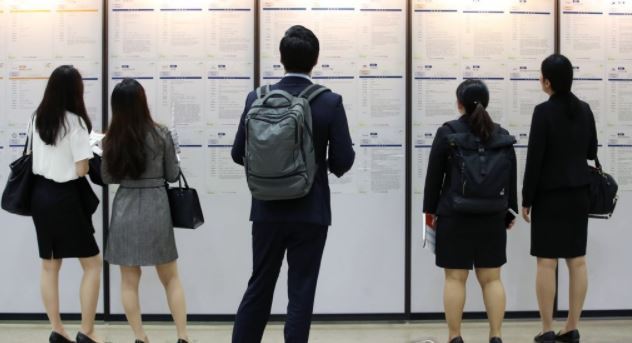The number of jobless people last month reached its highest level since 1999, while the government’s unemployment allowance payments also hit a record high, government data showed Sunday.
According to data compiled by the Korea Employment Information Service, the monthly average number of South Koreans without a job -- referring to those who have been out of job for four weeks or longer -- stood at 1.13 million as of end-August this year, up 45,000 from a year earlier and marking the highest figure since June 1999 when the given statistics began.
The accumulated amount of government unemployment allowance paid in January-August tentatively totaled 4.5 trillion ($4 billion), up 901.7 billion won, or 25 percent, from the same period last year, hitting a record high since the government started collecting the data in 2010.
Should the current trend continue, the annual total is estimated at 6.8 trillion won by year-end, up 7.1 percent from last year’s total of 5.2 trillion won, according to the KEIS.
 |
(Yonhap) |
Also, the on-year increase of 25 percent was noted for outrunning this year’s minimum wage hike rate of 16.4 percent. Over recent years, the two indices have generally mounted at a similar pace, reflecting a proportional correlation between wages and unemployment.
Starting January this year, the legal minimum hourly wage was set at 7,530 won, up 16.4 percent from 6,470 won, which led the country to revise up the unemployment allowance baseline by the same rate to 54,216 won. The minimum wage is slated to increase at another 10.9 percent next year to 8,350 won per hour, according to a state panel.
By industry, those who previously worked in the manufacturing sector accounted for 970.5 billion won, or 21.5 percent, of the total government allowance, reflecting a recent downturn for the sector.
“Employment situations could continue to worsen throughout September,” Deputy Prime Minister and Finance Minister Kim Dong-yeon said Friday in a meeting of economy-related ministers, expressing concerns on policy uncertainties, especially the steep pace of minimum wage hike.
By Bae Hyun-jung (
tellme@heraldcorp.com)








![[Today’s K-pop] Blackpink’s Jennie, Lisa invited to Coachella as solo acts](http://res.heraldm.com/phpwas/restmb_idxmake.php?idx=644&simg=/content/image/2024/11/21/20241121050099_0.jpg)